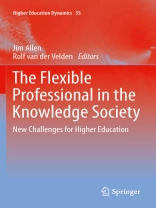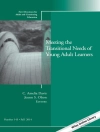Higher education policy has increasingly gained a European dimension, with its own distinct influence over national education policies. Against this background, a major project was launched, the REFLEX project, which aims to make a contribution to assessing the demands that the modern knowledge society places on higher education graduates, and the degree to which higher education institutions in Europe are up to the task of equipping graduates with the competencies needed to meet these demands. The project also looks at how the demands, and graduates’ ability to realise them, is influenced by the way in which work is organised in firms and organisations. The REFLEX project has been carried out in sixteen different countries and consisted of a large scale survey among some 70.000 graduates. This report presents the major findings and draws important policy implications.
Зміст
Acknowledgements.- Editors.- Contributors.- Management summary.- 1. Introduction;
Jim Allen and Rolf van der Velden_ 1.1 The policy context_ 1.2 The REFLEX project_ 1.3 Trends and demands_ 1.4 Methods and data_ 1.5 Structure of the report_ References_ Appendix 1.1 First and second level programmes per country.– 2. The Flexible Professional in the Knowledge Society;
Rolf van der Velden and Jim Allen_ 2.1 Introduction_ 2.2 The demands from the world of work_ 2.3 On the role of higher education in preparing graduates for the labour market_ 2.4 The effects of programme characteristics on competences_ 2.5 Does higher education provide a good basis to enter the labour market?_ 2.6 Conclusions_References.- 3. The Professional Work of Graduates;
Harald Schomburg_ 3.1 What makes a profession?_ 3.2 Who is working as a “professional”?_ 3.3 The role of professional knowledge_ 3.4 Professional role and professional identity_ 3.5 Professions and power_ 3.6 Discussion of results_ References_ Appendix 3.1 Mapping of 3-digit ISCO occupational codes to typology of professions.- 4. “Being Flexible”: Graduates Facing Changes in Their Work Environment;
Julien Calmand, Michela Frontini and Michele Rostan_ 4.1 The changing work environment of European graduates_ 4.2 Outline of the chapter_ 4.3 Changes in graduates’ work and employment situation_ 4.4 Employment mobility in graduates’ early career_ 4.5 The impact of employment mobility on graduates’ competences_ 4.6 Employment mobility as a way to get a good job_ 4.7 Graduates facing temporary work_ 4.8 Functional flexibility in graduate employment and work_ 4.9 Functional flexibility, competences, and higher education_ 4.10 Conclusions: two different ways of being flexible_ References.- 5. The Graduates in the Knowledge and Innovation Society;
Jean-Jacques Paul_ 5.1 Introduction_ 5.2 Some conceptual elements about innovation_ 5.3 What organisations are likely to be moreinnovative?_ 5.4 The place and the role of graduates regarding innovation_ 5.5 Are graduates equipped for innovation?_ 5.6 Innovation, occupations and rewards_ 5.7 Conclusions_References_Appendix 5.1 To what extent innovative activities are related to a specific working environment?.- 6. Mobilization of Human Resources;
Jim Allen_ 6.1 Clarifying concepts_ 6.2 Mobilization of human resources during higher education_ 6.3 Higher education as producer of “mobilization” competences_ 6.4 Mobilization of human resources after higher education_ 6.5 Determinants of utilization of own capacities_ 6.6 Determinants of mobilization of others’ capacities_ 6.7 Conclusions_References.- 7. International Dimensions of Higher Education and Graduate Employment;
Ulrich Teichler_ 7.1 The growing relevance of international dimensions_ 7.2 International mobility_ 7.3 The impact of international mobility on employment and work_ 7.4 Foreign language proficiency_ 7.5 Internationally mobile careers compared to home careers_ 7.6 Concluding observations_ References.- 8. Winners and Losers;
Liv Anne Støren and Clara Åse Arnesen_ 8.1 Introduction_ 8.2 Labour market situation – match or mismatch_ 8.3 Wages_ 8.4 Work orientations_ 8.5 Job satisfaction_8.6 Summary and conclusions_ References_ Appendix 8.1 Definition of mismatch_ Appendix 8.2 The effect on wages of gender, grades, level of education, field of study, mismatch and type of job contract_ Appendix 8.3 Definition of winners and losers according to the graduates’ response to the questions on work values and job characteristics (realization of work values).- 9. Conclusions and policy implications;
Rolf van der Velden and Jim Allen_ 9.1 General conclusions_ 9.2 Policy implications.- Index.












